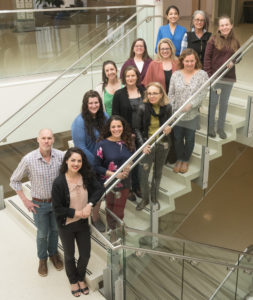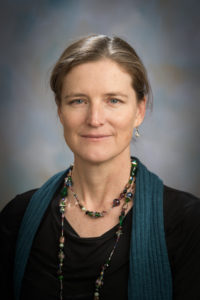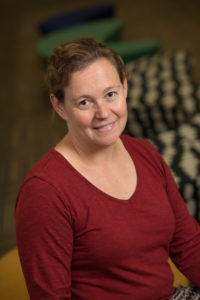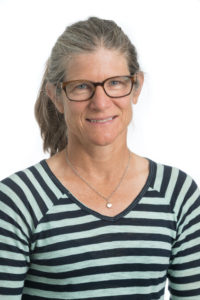A mentoring program launched last year for women faculty members at Colorado State University proved so successful that it’s being expanded this fall.
The program, “ENCIRCLE” (which stands for mENtoring CIRCLE), was created by the Standing Committee on the Status of Women Faculty in Fall 2018 to enhance support networks for women on the CSU faculty.

Former CSU President Tony Frank created the Standing Committee in 2014, charging it with designing strategies and promoting activities that enhance gender equity and the success of women faculty.
Since its creation, the group has promoted improved policies on parental leave, bullying, and salary equity, and the creation of a new faculty ombuds position. The committee also conducted a campus climate study, and produced a report on its study in 2016.
Mentoring circles are small groups of faculty members from a variety of departments and from various stages in their careers who meet regularly with a trained facilitator to discuss shared topics of interest.
“It can be challenging sometimes to talk with faculty members in your own unit, so you can bring issues to ENCIRCLE in a way that doesn’t get you embroiled in a political argument,” said Professor Ruth Hufbauer of the Department of Bioagricultural Sciences and Pest Management, co-chair of the standing committee and one of the three organizers of the mentoring circles.
“Research shows that if you’re connected at work, you do better work,” she added.
Circles filled up fast
Monique Rocca, an associate professor in the Department of Ecosystem Science and Sustainability, led the effort to create ENCIRCLE along with Hufbauer and Christine Olver, a professor in the Department of Microbiology, Immunology and Pathology. Rocca, co-chair of the Standing Committee, say that slots for the three 12-person mentoring circles formed last year filled up quickly, and those on the wait list will get preference when applicants are selected this fall.
This time, there will be twice as many circles to accommodate the demand, including circles that center on women of color.
Committee members
The Standing Committee on the Status of Women Faculty has a representative from each of CSU’s eight colleges, as well as at-large members and two representatives from the Commission on Women and Gender Equity. The members and their affiliations are:
- Ruth Hufbauer (co-chair)
- Monique Rocca (co-chair)
- Cori Wong (Commission on Women and Gender Equity)
- Jimena Sagàs (Commission on Women and Gender Equity)
- Jessica Metcalf (College of Agricultural Sciences)
- Lumina Albert (College of Business)
- Erika Miller (Walter Scott, Jr. College of Engineering)
- Roe Bubar (College of Health and Human Sciences)
- Katie McShane (College of Liberal Arts)
- Liba Pejchar (Warner College of Natural Resources)
- Meena Balgopal (College of Natural Sciences)
- Rob Sica (University Libraries)
- Christine Olver (College of Veterinary Medicine and Biomedical Sciences)
- Denise Apodaca (non-tenure track faculty representative)
- Sheryl Magzamen (at-large member)
- Noa Román-Muñiz (at-large member)
- Diana Prieto (at-large member)
- Caridad Souza (at-large member)
- Silvia Sara Canetto (at-large member)
- Leif Sorensen (at-large member)
“I highly valued ENCIRCLE as a way to interact with women in all stages of their careers in academia,” said Christine Olver, a professor in the Department of Microbiology, Immunology and Pathology. “As a senior faculty member, I benefited from the perspective of both junior faculty women and more senior women. It really opened my eyes to the experience of women in fields other than the sciences, and it also gave me valuable tools for interacting in my own department, including reflecting on my own approach to my working relationships.”

“I really enjoyed participating in the first year of the ENCIRCLE program,” added Jessica Prenni, an associate professor in the Department of Horticulture and Landscape Architecture. “For me, the best part was the connections I made with other amazing CSU women whom I may otherwise not have crossed paths with. It is a great way to get perspective on other parts of our campus. The meetings also provided a great opportunity to slow down and reflect in a safe and supportive environment.”
“For me, a big take-away was comfort in knowing that I am not alone in the challenges I have faced and will continue to face in my career,” said Tara Teel, a professor in the Department of Human Dimensions of Natural Resources. “While the specific circumstances for each person may be different, we all encounter stresses in the journey to succeed as academic professionals and leaders in our fields. ENCIRCLE’s mentoring program provided a great support network, and I gleaned tips from the facilitator and other participants about how to better navigate those stresses in the future.”
Career advancement, balance
ENCIRCLE provides support for career advancement and work-life balance, discussions on professional development, intellectual feedback, professional feedback and a sense of support and belonging. Rocca and Hufbauer say that while many women faculty receive mentorship within their units, it is often purely professional in nature, and some may feel isolated if the department has a small number of women.

Research has shown that mentoring circles in institutions of higher education create job satisfaction, provide support and a sense of belonging, support tenure and promotion, and help members feel comfortable in the higher education profession. Mentoring circles that integrate faculty from across the university and across ranks are likely to spur relationships and collaborations, which in turn can facilitate interdisciplinary scholarship and nurture best practices for supporting women.
“The EnCircle experience provided the opportunity to connect with female faculty at different stages of career and from varied professional disciplines,” said Khursheed Mama, a professor in the Department of Clinical Sciences. “Given a core value of confidentiality, the circle provided a safe place to share challenges and receive suggestions from other faculty. Through the considered and thoughtful discussions and learning about the breadth of contributions being made by female faculty on campus, I felt a sense of pride in CSU and better able to represent its professional diversity.”
Women faculty can encounter gender bias even before they earn their degrees. For example, in grading math assignments in elementary school, research shows that if teachers know the gender of the student, boys’ grades are inflated and girls’ grades are reduced, while if the gender is not known, they score equally. According to another study, when looking into graduate school, faculty respond to emails from men at a higher rate than women in most disciplines.

Other biases
Student perceptions of men and women also differ — research shows that students score teachers with names identifying them as men higher than those with names identifying them as women, even if it is actually one and the same instructor. These biases continue in the letters of recommendation used in job and promotion/tenure applications. Overall, these and other biases add up over time, and help explain why in most fields, there are fewer women faculty than men faculty, and fewer women of high rank.
Rocca noted that women also often play a larger role than men in service activities, and service is not rewarded or recognized to the extent that teaching and research are.
Applicants select their preferred meeting times as part of the five-minute application process and commit to attending all five meetings. The first monthly 90-minute session will be offered in November; applications can be completed online before Oct. 11.